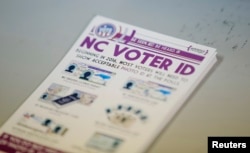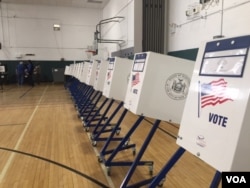Civil rights groups are considering an appeal to a court ruling that upheld a North Carolina law requiring voters to show photo identification at the polls, a ruling they say discriminates against minorities.
Tuesday's ruling by U.S. District Judge Thomas Schroeder in Winston Salem is a victory for Republicans who contend the law is needed to prevent voter fraud.
Republican North Carolina Governor Pat McCrory, who's seeking re-election this year, applauded the decision.
"This ruling further affirms that requiring a photo ID in order to vote is not only common sense, it's constitutional," he said in a statement.
But the ruling is being "condemned" by some civil rights organizations considering an appeal. The American Civil Liberties Union (ACLU) and Southern Coalition for Social Justice say the ruling keeps a law in place that unfairly targets African-Americans and other minority voters.
"The sweeping barriers imposed by this law undermine voter participation and have an overwhelmingly discriminatory impact on African-Americans," said ACLU Voting Rights Project Director Dale Ho.
"We are already examining an appeal," she added.
The case tested a key component of numerous voting restrictions that were approved after a U.S. Supreme Court decision in 2013 effectively eliminated a key part of the Voting Rights Act. The high court ruling eliminated the need for North Carolina and other states with a history of voter discrimination to get federal approval prior to changing voting laws that impact minorities.
Tuesday's decision is an indication of how federal courts may handle future cases involving voting laws.
The ruling also upheld the elimination of a week of early voting, the end of same-day registration, and the prohibition of counting of out-of-precinct ballots.
In the 485-page ruling, Judge Schroeder wrote that North Carolina has "provided legitimate state interests for its voter-ID requirement" and that the plaintiffs have "failed to show that any North Carolinian who wishes to vote faces anything other than the 'usual burdens of voting.'"
The National Association for the Advancement of Colored People (NAACP) supports the U.S. Justice Department position that the law disproportionately burdens African-Americans and Latinos, who are less likely than whites to possess the required forms of photo-IDs such as driver's licenses, passports or military IDs.
"We’re disappointed in the ruling, reviewing the decision carefully and evaluating our options,” said Justice Department Spokeswoman Dena Iverson.
If the case is appealed, the U.S. Court of Appeals for the Fourth Circuit in Richmond, Virginia would be the first to consider it.
Barring an appeal, the law would be in effect during this year's November elections, when the ramifications of the ruling could be significant in North Carolina. It has has been a swing state in the last two presidential elections, giving Democrat Barack Obama a narrow victory in 2008 and Republican Mitt Romney a hard-earned win in 2012.






